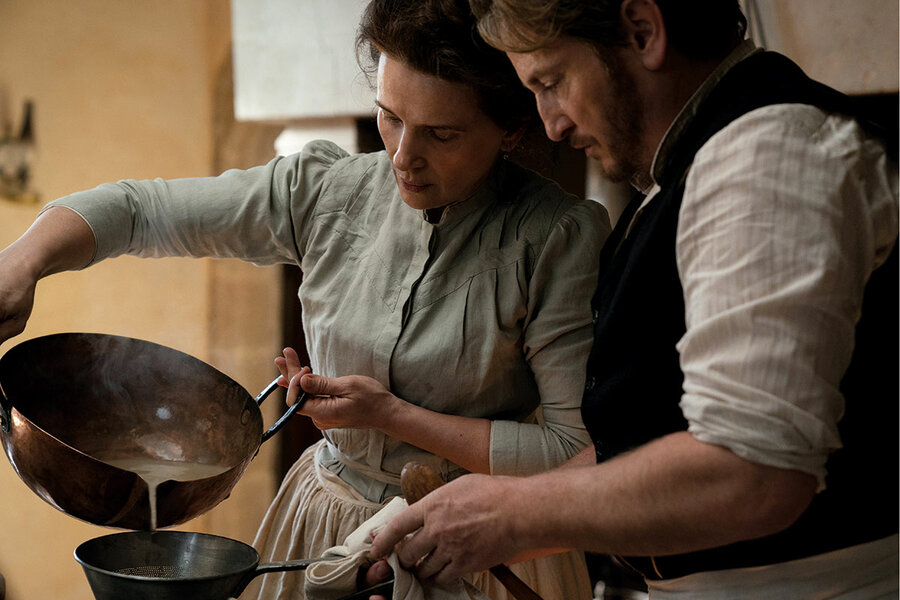Beauty and the feast: Savoring ‘The Taste of Things’
Loading...
The marvelous new French film “The Taste of Things,” set in 1885, opens with a culinary flourish. Eugénie (Juliette Binoche), the head cook of a famed Loire Valley château, is whipping up a storm in the kitchen. She swings adroitly between kettles, saucepans, stovetops, and basins as she conjures a potpourri of delicacies – all of which the writer-director, Trần Anh Hùng, exhibits for us in glistening array. The camera, along with Eugénie and her assistant, Violette (Galatéa Bellugi), never stops moving. It’s such a hunger-inducing display that the effect is almost comical. My first thought was: If the entire movie is like this, I am never going to get through it.
Eugénie’s boss, Dodin Bouffant (Benoît Magimel), is also her sometime lover. For 20 years they have lived together in the château, though in separate quarters. (It’s worth noting that Magimel and Binoche were once a couple, and share a daughter.) A nationally famed gourmet, Dodin regularly hosts a gathering of all-male friends and investors who savor the dishes that Eugénie fervently prepares to his specifications.
The men, no chauvinists, are always clamoring for her to join in the meal, but she is content to stay apart from the festivities. Her refusal is almost a point of pride. She sees herself as a kind of magician, as indeed she is. She doesn’t need anyone to tell her how good the meal is. She already knows.
Why We Wrote This
Food in films is often a metaphor for what is really going on in people’s lives. French offering “The Taste of Things” extends that idea, offering one of the most romantic movie moments our critic has ever seen.
Eugénie’s hauteur, gentle but willful, is an indication of how she values herself. This is no “Upstairs, Downstairs” scenario. Eugénie is fully Dodin’s equal – if not in class, then in everything else. It is he, and not she, who regularly implores that they get married. She clearly believes that being his star cook elevates her above mere domesticity. Wifedom would seem like a comedown. And so for a long stretch of the movie, the perpetually smitten Dodin must content himself with her occasional amatory favors. Her beauty has the same ambrosial effect on him as her feasts.
Most of the celebrated movies centering on lavish repasts, from “La Grande Bouffe” and “Babette’s Feast” to “Big Night,” have used food as a metaphor for what else is really going on in people’s lives. “The Taste of Things,” which was the French Oscar entry for best international feature, does this to an extreme degree. Even though the scrumptious factor in this film is very high, it never turns into a foodie pageant. Hùng – whose script is very loosely based on the 1924 novel “The Passionate Epicure” by Marcel Rouff – is careful to keep the focus on Eugénie and Dodin. Both are played with exquisite feeling by Binoche and Magimel.
Hùng frames their romance in imagery that sometimes recalls the paintings of Gustave Courbet and Pierre-Auguste Renoir, but never self-consciously so. He wants to suggest a continuum between the two lovers and those artists. Eugénie and Dodin, too, are artists. Like those painters, they share a rhapsodic embrace of nature.
It is this embrace that gives “The Taste of Things” its quietly passionate core. We are never made to ask how, in this disruptive late 19th-century era, these people are able to live their gilded lives with such abandon. The film periodically risks turning into a swoony fantasy. But it is a fantasy we can favor because it’s one we all can share.
Eugénie may covet her independence, but she also recognizes the love that Dodin bears for her, and she for him. This love is never so apparent as when her periodic fainting spells turn serious. Dodin may be renowned as “the Napoleon of gastronomy,” but imperiousness has no place in his life. As Eugénie lies bedridden, he cooks her favorite meal for her. Then, almost as if he were praying, he asks if he may watch her eat it. It’s one of the most romantic movie moments I’ve ever seen. And, of course, she says yes.
Peter Rainer is the Monitor’s film critic. “The Taste of Things” is rated PG-13 for some sensuality, partial nudity, and smoking. It is in French with English subtitles.






